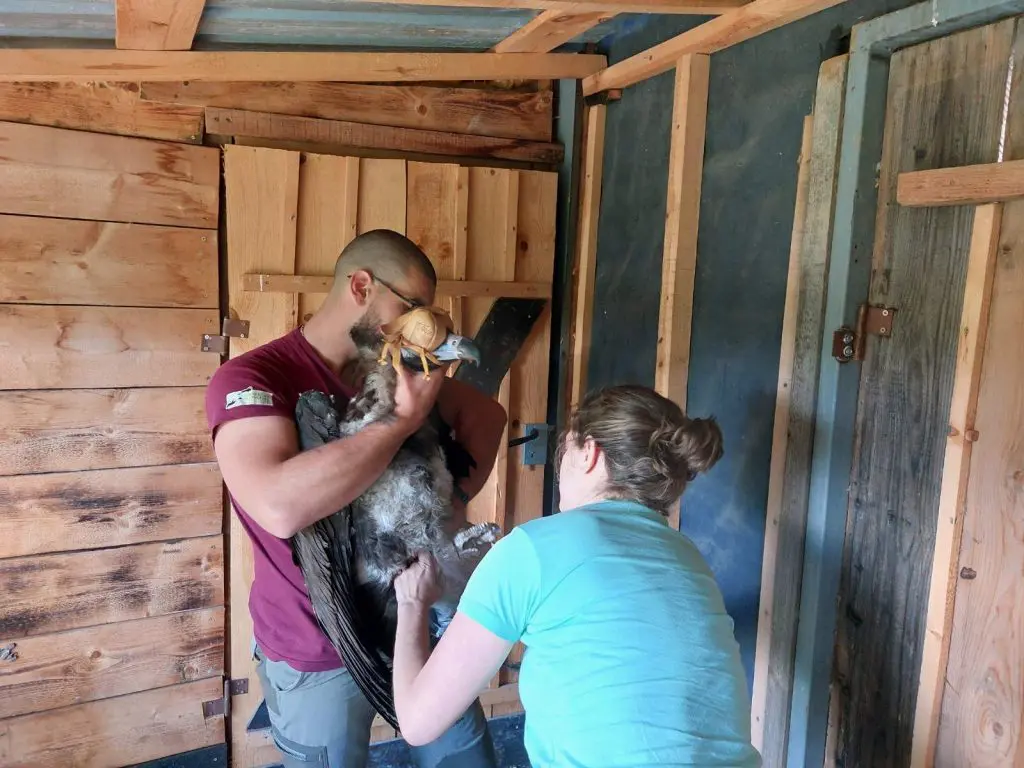
It’s with great excitement that we share the news that the two young Cinereous vultures recently released in Bulgaria as part of a the Vultures Back to LIFE project have fledged their hacking platform.
Leaving the nest
The two birds, Boyan and Ostrava, were released into the wild at the end of July and this last week both birds took their first steps and flights to independence and a life as wild birds. At 110 days old Boyan was the first to leave the hacking nest on Wednesday 15 August in Kotel mountain, and was soon followed by the 119 day old Ostrava. They jumped out of the nest and started walking, eventually reaching the highest point of the cliffs behind the nest. Here they stayed together and exercised their flight muscles with intensive wing beating before spending the night on the ground. On Thursday 16 August it was Ostrava who was the first to take flight with Boyan soon to follow.
Wild visitors

Whilst on the mountainside the two were visited by a three or four year old wild Cinereous vulture who purely coincidentally was traveling around the area, likely to be from the colony in the Greek Dadia National Park. Just before their first flights the Cinereous vulture as well as a Griffon and Egyptian vulture both attempted to land next to them but were quickly chased away by the confident young birds.
Naming Cinereous vultures

One of the Cinereous vultures was named after Bulgarian alpine climber and biologist, Boyan Petrov, who was dedicated to nature conservation and was due to be the public face of the reintroduction campaign when he tragically disappeared in an attempt to climb Shishapangma in Tibet. Ostrava meanwhile is named after the zoo where they were born, just like the third cinereous vulture released this week, Riga.
Introducing Riga
Riga is the third of the Cinereous vultures reintroduced into Bulgaria as part the first stage of the Vultures Back to LIFE conservation project. Born in Latvia’s Riga Zoo, Riga arrived later to Bulgaria than Boyan and Ostrava and it was decided to wait until the other two birds had fledged before releasing Riga into the wild. With their recent fledging, Riga was released at the nesting site and just like Boyan and Ostrava will remain there, fed and monitored without human contact by dedicated staff from Fund for Wild Flora and Fauna and the Green Balkans until it fledges.
Vigilance against poison
This historic reintroduction is the result of over 20 years of hard work by vulture conservation teams in the Bulgaria but one of the main threats that caused their extinction in Bulgaria and much of the Balkan Peninsula still exists today, illegal wildlife poisoning. Through our recently launched Balkan Anti-Poisoning Project we are working with partners in five Balkan states to tackle this problem and support government and wildlife conservation organisations to put an end to this practice. Using #BalkansAgainstPoisoning on social media also helps raise awareness of the impacts of poisoning on vultures. We call on all organisations, including all relevant governmental institutions to help us be vigilant against this illegal use of poison and to protect these birds and other Balkan vultures.
Vultures Back to LIFE
Led by the wildlife conservation charity Green Balkans, and bringing together partners from Bulgaria, Spain and Germany, Vultures Back to LIFE aims to reintroduce the cinereous or Eurasian black vulture (Aegypius monachus) to Bulgaria. The team will transfer and release around 50 birds coming from wildlife rehabilitation centers in Spain into the wild in Bulgaria as well as creating supplementary feeding stations and improving populations of wild herbivores, improving the nesting conditions and creating artificial nest sites and tackling some of the major threats to vultures in the country such as insulating electricity pylons.




